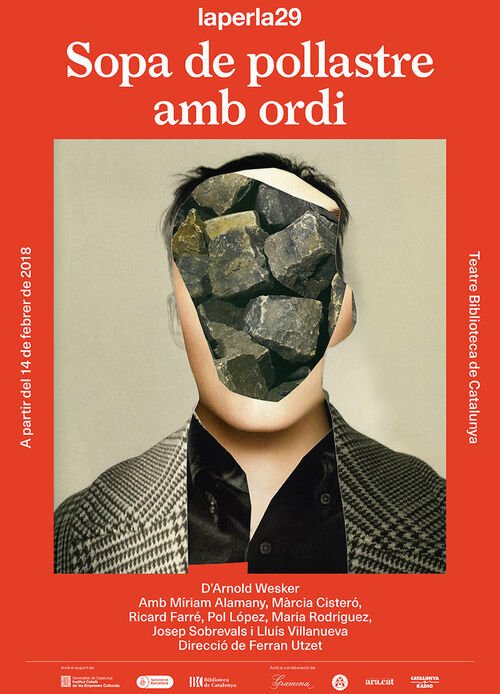
Sopa de pollastre amb ordi
From Arnold Wesker, Direction by Ferran Utzet
"The only thing that has rotten society is progress! Damned progress! It turns us upside down and convinces us that we are fine! But of course... who dares to fight against progress?"
The antifascist demonstration that took place in the working-class London neighborhood of East End in 1936 and the anti-communist uprising in Hungary in 1956 are the two historical events that frame this work.
"Chicken Soup with Barley" tells the story of a working-class family, the Kahns, in a rapidly changing world. The play shows how time erodes, slowly and relentlessly, everything in its path. The progressive loss of convictions, dreams, and political ideals, passivity, and negativity in the face of injustices are presented in parallel with the disintegration of the Kahn family, increasingly fragmented and divided.
Following the lives of seven characters who once fought together to build a better world, Wesker exposes different positions towards ideals and life, but at the same time, he creates an enormously exciting and touching family portrait towards which we feel an immediate identification and tenderness.
Text
Arnold Wesker
Direction
Ferran Utzet
Version of
Llàtzer Garcia i Ferran Utzet
With
Míriam Alamany
Màrcia Cisteró
Ricard Farré
Pol López
Maria Rodríguez
Josep Sobrevals
Lluís Villanueva
Set Design
Josep Iglesias
Lighting Design
Guillem Gelabert
Sound Design
Damien Bazin
Costume Design
Annita Ribera
Makeup
Àngels Salinas
Assistant Director
Mònica Molins
Movement Coach
Marta Gorchs
Stage Management
Marc Serra, Carles Algué, and Paula Roto
Technical Staff
Juan Boné and Arnau Planchart
Audience Services
Núria Ubiergo and Mireia Colomer
Intern at El Timbal
Rosa Maria Ordoñez
Photography
Bito Cels
Graphic Design
Andrea Gusi
Collage
Albert Cano
A production of La Perla 29
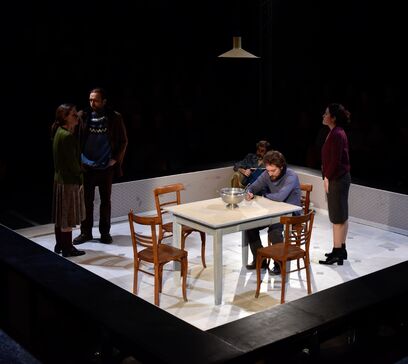
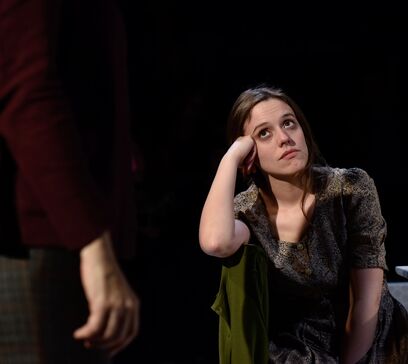

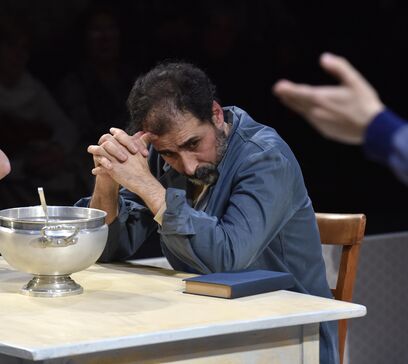


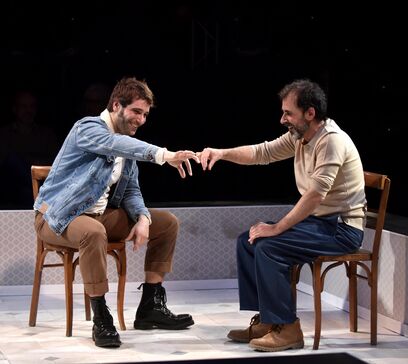


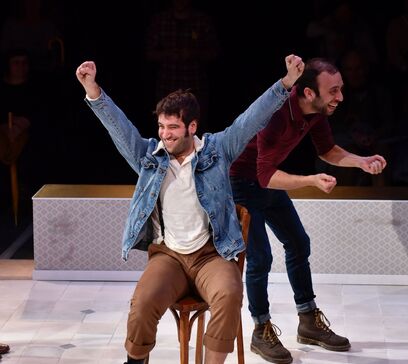



I lived through the events of October with a double anguish. One was collective: the one that, combined with enthusiasm and empowerment, made us dream that yes, this time we could, that the moment had come, that soon we would start building a new country. And one was individual, secret: the one that kept me awake at night wondering what this work with an improbable title that would premiere in a few months at the Library would explain to my people.
I had chosen it a year ago. I was moved to tears by the way Wesker describes the loss of political and individual convictions. It's becoming increasingly difficult for me to keep them strong, the ideals, and the faith I have in a better world doesn't always hold up when confronted with the contradictions of modernity. At the same time, I still believe that we must continue to believe that a fairer world is possible, and that we must continue to fight so that, little by little, this dream world becomes real. Perhaps that's why the play moved me so much: because it shows that time and life can erode this illusion... Without knowing exactly why, I thought it was necessary to stage it.
But autumn came and the story accelerated. In the revolutionary scenario that was opening up in the country, everything was changing! What kind of message did the play send? The parallels between the events described in the play and what we were experiencing were so great that suddenly I couldn't tell if the words of Chicken Soup were the warmth and vigor we needed to move forward or if, on the contrary, they generated discouragement. Because the responsibility of the artist also involves that, right? Generating reflection and energy from within, from militancy with life and politics, and not just from the distance of intellectuality!
It's 2018 and it feels like a long time since October. As I write these lines, a few weeks before the premiere, the new country has not arrived, and there are people imprisoned for their ideas. In prison! Faced with this reality so serious, terrible, and absurd that I can't help but denounce, everything becomes fragile. Like Wesker's characters, I am overcome by disorientation, and the idea that the play could send a clear message of encouragement or discouragement seems naive to me. Instead, I still believe that yes, it must be represented, and it must be represented now. And I think I know why: because theater, when it's real theater, can make us feel that we are not walking alone.
Break a leg.
Ferran Utzet
Availability
our newsletter
Do you want to become a member of #AsSocPerla? All the information here.
C/ Carme, 44 1r 2ª
Tel. 93 217 17 70
C/ Hospital, 56
Tel. 647 29 37 31
(a partir d'1h i 1/2
abans de la funció)
- Sitemap
- |
- Legal Notice
- |
- Cookies usage
- |
- Contact
- |







